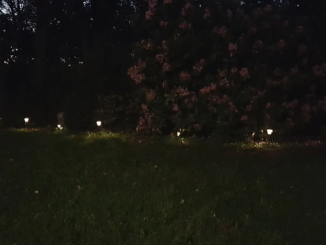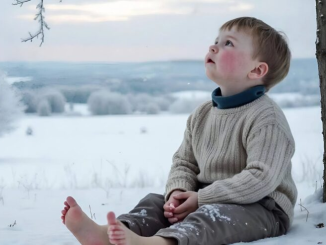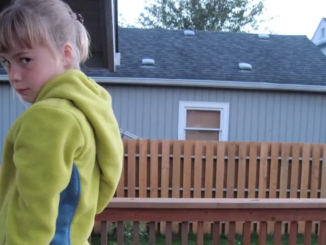I don’t know how long she stood out there before I arrived.
The wind had picked up, swirling dry snow through the old wooden gate like it was alive. Her scarf—red and green, the one she always wore when I was little—was tied snug under her chin. Same heavy coat. Same worn-out boots with the rubber peeling at the toes.
She looked smaller than I remembered. But her eyes… they were exactly the same.
I dropped to my knees before I even said a word. The cold bit straight through my uniform, but I couldn’t feel it—not compared to the fire that exploded in my chest the moment she wrapped her arms around me.
And I broke.
For all the times I tried to hold it together out there—for every night I pretended I didn’t miss home so bad it made me shake—this was the moment I fell apart. Right there, in the snow, in front of the woman who raised me on nothing but boiled potatoes, bedtime stories, and unshakable love.
“I told you,” she whispered, rocking me like a child. “I told you I’d be right here.”
She had no phone. No internet. No way of knowing the date, let alone the time. But somehow… she knew.
And then, over her shoulder, I saw it. A faded piece of cloth tied to the fencepost.
My old scarf. The one I wore the day I left.
She’d tied it there so I’d see it from the road—just in case the car didn’t stop. Just in case I passed by and forgot where home was.
But she didn’t know what I had in my pocket.
Not yet.
We sat by the fireplace later that evening, the kindling crackling softly as steam rose from our mugs of tea. She hadn’t asked about the war—not once. Instead, she talked about the garden, the chickens, and how Mrs. Dunlap down the lane finally got herself a new roof after years of complaining about leaks. It was as if she wanted to fill the silence between us with something normal, something safe.
I sipped my tea, letting the warmth seep into my bones. For the first time in months, maybe years, I felt still. Grounded. Home wasn’t just a place; it was her voice humming an old tune while she stirred soup on the stove. It was the creak of the floorboards beneath my boots. It was the faint smell of lavender soap lingering in the air.
“Are you hungry?” she asked suddenly, setting her mug down. “You’re too thin. I can fix you something proper.”
“No, Ma,” I said, smiling for the first time all day. “This is perfect.”
She studied me for a moment, her gaze sharp despite the softness in her face. “You’ve changed,” she said quietly. “Not just your hair or… whatever else happened out there.” She gestured vaguely toward my uniform, which now lay draped over a chair near the hearth. “Your eyes. They look tired.”
I swallowed hard. How could I explain? How could I tell her about the nights spent staring at the stars, wondering if I’d ever see these walls again? Or the faces of men I’d never forget, no matter how much I wished I could?
“I’m okay,” I lied. “Just… trying to figure things out.”
She nodded slowly, accepting my answer without pressing further. That was Ma—always giving space when you needed it most. But then she reached into the pocket of her apron and pulled out a folded letter. “This came for you last week,” she said, handing it to me. “From some government office. I didn’t open it.”
My stomach tightened. Government letters weren’t usually good news. I took it hesitantly, unfolding the crisp paper and scanning the words inside. At first, I thought it was another formality—a discharge notice or updates about benefits—but halfway down the page, my breath caught.
“They’re selling the land,” I murmured, reading aloud. “They want to buy the property for development. They’re offering us money… but if we refuse…” My voice trailed off.
Ma sighed deeply, leaning back in her chair. “I figured as much. They’ve been sniffing around for years, talking about building houses or factories or whatever nonsense. Progress, they call it.”
“What are you going to do?” I asked, though I already knew the answer.
“What choice do I have?” she replied, her tone resigned but firm. “This house has been in our family for generations. Your grandfather built it with his own two hands. I won’t sell it, not unless I absolutely have to.”
Her words hung heavy in the air. I glanced at the scarred wooden table, the mismatched chairs, the shelves lined with jars of preserves and books with cracked spines. This house wasn’t just wood and nails—it was everything we had. Everything we were.
But progress didn’t care about sentimentality.
The next morning, I woke early and stepped outside to clear my head. The sun was just beginning to rise, casting golden light across the frost-covered fields. In the distance, I spotted something moving—a figure bundled in thick layers, trudging through the snow.
It was Ma.
She carried a shovel over her shoulder and seemed determined, though her steps were slow and deliberate. Curious, I followed her path until we reached the edge of the property, where a dilapidated shed stood leaning precariously against the wind. She set the shovel down and began digging, pausing occasionally to wipe sweat from her brow.
“What are you doing?” I called out, approaching cautiously.
She looked up, startled, then smiled sheepishly. “Oh, I thought I’d start clearing this area. Maybe plant some trees come spring. You remember how much your father loved apple blossoms.”
I stared at her, incredulous. “Ma, they’re going to bulldoze this place. What’s the point?”
Her expression hardened slightly, and she leaned on the shovel. “Because it’s mine,” she said simply. “And because hope doesn’t wait for permission.”
Her words struck me like a punch to the gut. Hope. Was that what kept her standing by the gate every day, waiting for me to return? Was that why she refused to give up on this patch of earth, even when the odds were stacked against her?
I grabbed another shovel from the shed and joined her. Together, we dug until the ground was marked with rows of freshly turned soil. By the time we finished, the sun had climbed high in the sky, and my muscles ached from the effort. But for the first time in ages, I felt alive.
Over the next few weeks, I threw myself into helping Ma prepare for whatever might come. We repaired fences, cleaned out the barn, and stocked the pantry with canned goods. Word spread quickly among the neighbors, and soon people started showing up with tools, food, and offers of help. Even Mrs. Dunlap brought over a basket of muffins, muttering something about “community spirit” under her breath.
One afternoon, as I was hauling firewood into the shed, a car pulled up the driveway. Out stepped a man in a suit, clutching a clipboard and looking distinctly out of place amidst the rustic scenery. He introduced himself as Mr. Caldwell, the developer’s representative, and politely requested a meeting with Ma.
She invited him in, offering tea and cookies, and listened intently as he explained their plans for the land. They wanted to build luxury homes, he said, promising significant financial compensation and relocation assistance. When he finished, he looked expectantly at Ma, clearly anticipating her agreement.
Instead, she smiled kindly and shook her head. “Thank you for coming all this way, Mr. Caldwell,” she said. “But this land isn’t for sale.”
He frowned, clearly unaccustomed to rejection. “Mrs. Harper, surely you understand the value of this offer. With the money, you could live comfortably anywhere you choose.”
“I already live comfortably,” she countered gently. “Right here.”
Caldwell opened his mouth to argue but seemed to think better of it. After a tense pause, he nodded curtly and gathered his things. As he walked back to his car, I noticed something unusual: a group of neighbors had gathered near the gate, watching silently. When Caldwell drove away, they erupted into cheers, clapping and hugging each other like they’d won a battle.
Ma stood beside me, her arms crossed, a satisfied smile playing on her lips. “Looks like we’ve got ourselves an army,” she said.
Months passed, and the fight to save the land became a rallying cry for the entire town. Fundraisers were organized, petitions circulated, and legal battles waged. Through it all, Ma remained steadfast, her quiet strength inspiring everyone around her.
Then, one crisp autumn morning, the verdict arrived. The court ruled in our favor, citing historical preservation laws and overwhelming public support. The developers were forced to abandon their plans, and the land would remain untouched—for now.
That evening, as the sun dipped below the horizon, Ma and I stood together on the porch, watching the stars appear one by one. She slipped her hand into mine, squeezing gently.
“You did good, son,” she said softly. “You came home when it mattered most.”
I shook my head, tears pricking my eyes. “No, Ma. You did. You taught me what it means to stand your ground. To believe in something bigger than yourself.”
She chuckled, patting my hand. “Well, I suppose we make a pretty good team.”
As we stood there, bathed in moonlight, I realized something important: life isn’t about avoiding storms—it’s about learning to dance in the rain. Sometimes, the hardest battles are the ones worth fighting. And sometimes, the greatest victories aren’t measured in dollars or acres but in the love and resilience of those who stand beside you.
If this story resonated with you, please share it with others and leave a comment below. Let’s spread a little hope and remind each other that even in the toughest times, we’re never truly alone.






Leave a Reply